Iraq. A Book to Live Again.
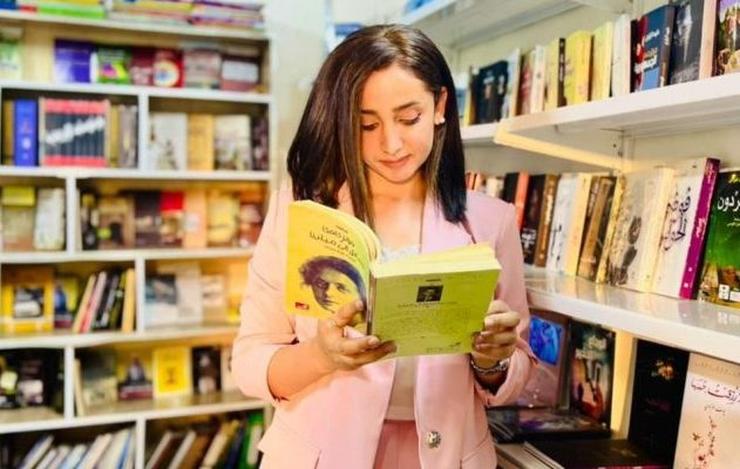
The young Yazidi Janan Shaker Elias has opened a bookshop in a village on the Nineveh Plain that suffered the invasion of Isis: “When we returned, I decided that reading was among the essential necessities”.
On the white shelves are volumes of fiction and nonfiction, history books and biographies of famous people, philosophical texts, and children’s publications. In the middle of the room, some young people are sitting at a large table intent on reading and studying.It would be a bookshop like many others, were it not for the fact that the Janan Bookshop is located in Sreshka, a village in the Nineveh Plain, the ancient Mosul, which in the summer of 2014 suffered the devastating invasion by the cutthroats of the ‘Islamic State’ who wanted to erase any sign of pluralism and establish a society under the banner of the most obscurantist and distorted vision of the Shari’a. In this area in Northern Iraq, historically home to different communities including many Eastern Christians, after the liberation and the slow re-securing of the area, it is still struggling to return even to a difficult sort of normality.
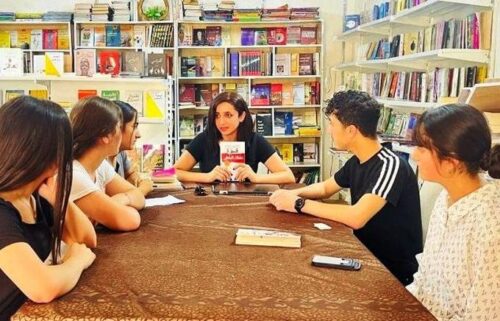
“We often organize reading groups” Photo Chiara Zappa
“But although many things are missing here, books are essential to return to life”: there is no doubt in the mind of Janan Shaker Elias, a young teacher in a village school – about 5,000 inhabitants in the Tall Kayff district – who, faced with the arrival of Isis, was forced to flee with her family, along with hundreds of thousands of other Iraqis, abandoning everything.
Yazidis like her, members of an ancient community considered heretical by fundamentalists, were the ones who paid the highest price for the invasion: massacres, kidnappings, and enslavement.
“My family managed to survive by fleeing to Turkey and then to Iraqi Kurdistan”, says Janan, now 29. “For years we stayed away from home, taken in by refugee camps. But despite the fatigue, both physical and emotional, in Duhok I continued my university studies and I graduated in physics; a success of which I am proud”.
Meanwhile, the Iraqi army and Kurdish militias fought to oust the terrorists from the Nineveh Plain; in the autumn of 2016 several centres were liberated, although the terrible battle to reconquer Mosul would last until the following summer. “When we finally returned to the village – recalls the girl, who lives with her father after her mother died and her brothers got married and emigrated – the main concern was to ensure safety and restore essential services, such as electricity and
access to potable water”.
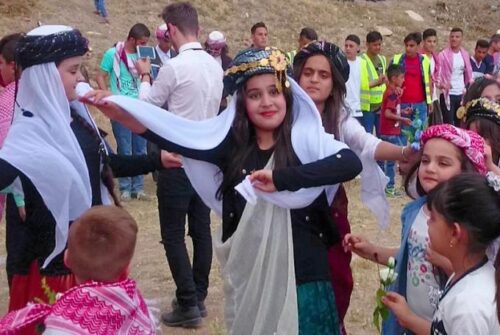
Yazidis children celebrating a Yazidi ceremony called Tawwaf in the town of Bashiqa in Iraq. CC BY-SA 4.0/ Ammar Doghat
But she, like many fellow citizens, especially young people, also lacked something else: “In the whole district there was no place to consult or buy books, we were practically cut off from knowledge”. To the fury of the anti-culture fundamentalists – in the Mosul area there were countless cases of closed bookshops, libraries of historical value destroyed and collections of ancient manuscripts bravely rescued to save them from looting and devastation – in Sreshka there was the added isolation which already before the war had prompted Janan to obtain some volumes with some difficulty by ordering them via the internet (and waiting a very long time for deliveries). So, four years ago the young woman started right from there, setting up a system for selling books through the web, which proved very successful.
“For me, it was just one more confirmation that, even in our small villages, there was a public eager to have access to reading. An audience that I wanted to increase, to create a new generation open to diversity”. This is how the Janan Bookshop was born, when the enterprising girl, one year ago, decided to move from the virtual world to the real one, opening the first and only bookshop in the districts of Tall Kayff and Shaykh Han in the centre of the village. A small place but with attention to detail: from the volumes that hang from the ceiling like ‘lamps of knowledge’ to the posters on the walls that carry the history of the area and the biographies of intellectuals from all over the world who inspired the young owner. A sign that even from this remote corner of Iraq it is possible to keep an open mind on universal wisdom.
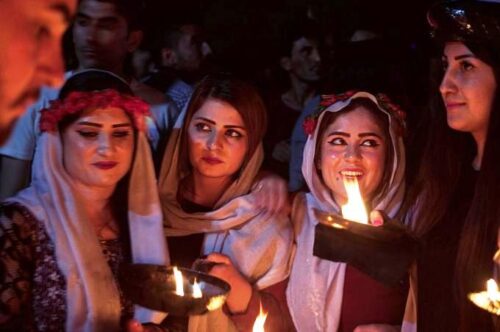
Yazidi New Year festival at Lalish. A corner of the Janan Bookshop is reserved for titles that tell the story and religion of the Yazidis, CC BY-SA 4.0/ Levi Clancy
“In the bookshop, customers have almost two thousand titles available, divided by genres and discipline, but they can also book others”, explains Janan, showing the corner dedicated to fiction, in which George Orwell’s 1984, The Little Prince by Saint-Exupéry, but also various works by the Egyptian feminist Nawal al-Sa’dawi and of course many texts by Iraqi and Arab novelists, are displayed. She goes on to say “People really appreciated my initiative, especially students and young people. Here they can not only buy books but also come and read them freely, or borrow them. We often organize reading groups, presentations with authors, and seminars held by writers and researchers on literature, philosophy, and culture in general”.
For the Sreshka bookseller, the project also represents a contribution to the re-composition of the local community fabric, torn apart by conflicts and sectarian impulses: “Whoever reads develops greater awareness and can have the tools to build a more mature society, prepared to face our difficult social and economic situation”, she says.
For her part, Janan is personally involved in a series of initiatives which, at the local and national level, deal with the great issue of reconciliation, starting with her commitment to the NGO Peace and Freedom Organization, based in Erbil, which works for conflict resolution and the promotion of pluralism, tolerance and active citizenship, including through the publication of books.
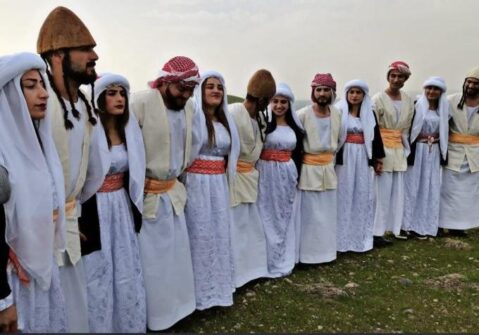
Yazidis wearing traditional clothes. CC BY-SA 4.0/ Hamdi Hamad
“Isis has caused not only material but also social destruction and I, as a citizen who has experienced this tragedy first-hand, want to take part in the movement under way to recreate integration”.
The young entrepreneur, especially, does not forget the genocide suffered by her community, the Yazidis, accused by fundamentalists of being ‘devil worshippers’. For this reason, while she is active in the mobilization that demands recognition of sectarian violence even with adequate compensation and forms of social reintegration, she is committed in her own way to combating stereotypes and encouraging the awareness of her coreligionists of their traditions; a corner of the Janan Bookshop is reserved for titles that tell the story and religion of the Yazidis, and authoritative community leaders often speak at meetings organized in the bookstore.
“In Sreshka we are all Yazidis, but there are Christians and Sunni Muslims living in the surrounding villages – she says -. Today we live in peace in this area and when Pope Francis came here to visit, we welcomed him with joy”. The difficult socio-economic situation, however, represents a constant element of instability: “Above all, young people are victims of unemployment and lack of opportunities while those who can do so emigrate. Iraq will not change until the political class makes a change”.
Meanwhile, from this small village in the Nineveh Plain, Janan has started her personal, small revolution, which begins with reading and knowledge. And given the success of the project, with so many customers who visit her bookshop every day and the recent proposal to open a branch in Tall Kayff as well, the young woman’s motto is to be believed: “Books can change lives”. (Open Photo: Janan Shaker Elias in her Bookshop. Photo C.Z.)
Chiara Zappa/MM



